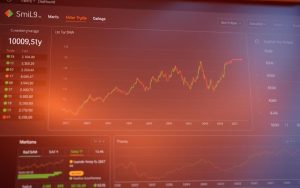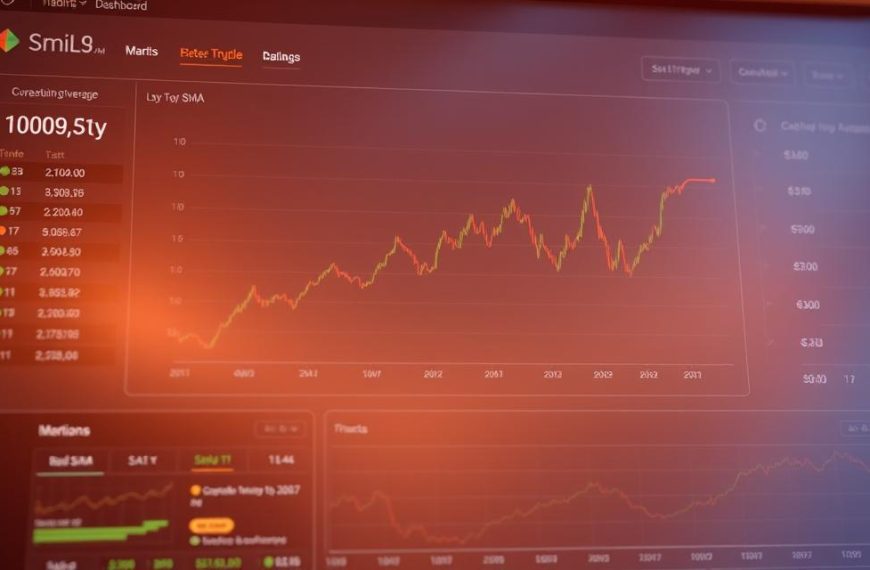Bitcoin trading has transformed financial markets. It blends technological innovation with financial strategy. Traders play a vital role in this digital economic landscape.
Bitcoin exchanges are crucial for traders. They connect buyers and sellers globally. These platforms work like traditional stock markets, enabling cryptocurrency transactions1.
Traders can use various methods, including market orders. These allow purchasing at current best prices. Understanding these mechanisms is key to successful trading1.
Bitcoin emerged in 2008, introduced by the mysterious Satoshi Nakamoto. This marked the start of a financial revolution. Since then, traders have navigated a volatile market2.
Successful Bitcoin traders are tech-savvy and financially astute. They adapt quickly to market changes. Their skills are crucial in this complex trading environment1.
Many factors affect investment outcomes. These include transaction fees, exchange liquidity, and price fluctuations. Traders must consider all these elements1.
Cryptocurrency trading attracts diverse participants. These range from individual investors to professional traders. The potential for profit is a major draw2.
Bitcoin’s price history shows remarkable volatility. In recent years, values have ranged from under $20,000 to over $69,000. This unpredictability creates both risks and opportunities2.
What is a Bitcoin Trader?
A Bitcoin trader is a financial expert who buys and sells digital assets. They use strategic methods to speculate on price changes in cryptocurrency markets. These professionals operate through CFD accounts and direct cryptocurrency exchanges.
Bitcoin trading requires advanced cryptocurrency skills and thorough market analysis. Traders use various strategies to profit from Bitcoin’s volatility. They aim to capitalise on the potential for significant returns.
Types of Bitcoin Trading Activities
The cryptocurrency trading landscape offers diverse approaches for investors:
- Day Trading: Rapid transactions within single trading sessions3
- Swing Trading: Capturing price movements over several days or weeks3
- Position Trading: Long-term investment strategies focusing on extended market trends3
Core Skills Required for Trading
Successful Bitcoin traders develop a robust skill set that includes:
- Technical Analysis: Understanding chart patterns and market indicators3
- Risk Management: Implementing strategic protection mechanisms3
- Emotional Control: Maintaining disciplined decision-making processes
Understanding Market Analysis
Cryptocurrency market analysis involves evaluating factors that influence digital asset prices. Traders assess market capitalisation, media coverage, and global economic trends. These elements help them make informed investment choices.
The cryptocurrency market’s decentralised nature provides unique opportunities for strategic trading4.
The Evolution of Bitcoin Trading Market
Bitcoin’s journey from a digital experiment to a global financial phenomenon is truly remarkable. In May 2010, a significant milestone occurred when someone bought two pizzas for 10,000 BTC. This transaction marked a crucial moment in digital currency history5.
Bitcoin’s price growth has been extraordinary. Starting under $0.20 in 20106, it has experienced massive value increases over the years.
In 2013, the price soared from $13 to $732. By 2017, it reached $19,188. The year 2020 saw a 416% annual growth.
- 2013: Price surged from $13 to $732
- 2017: Reached $19,188 by year-end
- 2020: Remarkable 416% annual growth
- 2021: All-time high of $69,000
Key institutional adoptions accelerated the cryptocurrency market’s development. Microsoft accepting Bitcoin for Xbox purchases was a notable advancement. The U.S. Commodity Futures Trading Commission approved the first Bitcoin financial product5.
| Year | Key Market Event |
|---|---|
| 2013 | First Bitcoin ATM launched in Vancouver |
| 2014 | Over 100,000 merchants accepting Bitcoin |
| 2021 | Bitcoin reaches $64,895 peak |
The trading landscape changed dramatically as exchanges like BTC China became major global platforms5. By 2024, Bitcoin’s market maturity was clear. Spot ETFs held over $61 billion in assets6.
Essential Tools and Platforms for Bitcoin Trading
Bitcoin traders need sophisticated tools and reliable platforms to succeed. The right technologies can maximise potential in this dynamic market. Robust trading tools are essential for navigating cryptocurrency trading7.
Selecting the right exchanges and tools is crucial for successful trading. Modern traders have access to an impressive array of digital resources. These resources are designed to streamline investment strategies.
Popular Trading Exchanges
Cryptocurrency exchanges are vital for Bitcoin trading. Binance offers over 500 trading pairs, providing extensive market opportunities7. These platforms allow traders to execute trades and manage digital assets.
- Binance: Extensive trading options
- Coinbase: User-friendly interface
- Kraken: Advanced security features
Technical Analysis Tools
Traders use sophisticated analysis tools to make informed decisions. TradingView offers over 100 technical indicators for comprehensive price movement analysis7. These platforms help identify potential market trends and trading opportunities.
Portfolio Management Software
Bitcoin trading platforms offer advanced portfolio tracking. CoinTracker and Delta help manage multiple assets across various exchanges7. These tools track daily profit and loss for traders.
About 80% of new traders use educational resources before their first trade7. This highlights the importance of thorough trading preparation.
Pro tip: Use automated trading bots to execute trades in milliseconds. This can help capitalise on rapid market fluctuations7.
Choose Bitcoin trading platforms with robust tools and reliable performance tracking. Look for platforms that offer educational resources to support your investment journey.
Market Making in Cryptocurrency
Cryptocurrency market makers are vital in digital asset trading. They provide liquidity by placing buy and sell orders across exchanges. Their main job is to keep trading smooth and markets stable.
Liquidity providers use clever strategies to boost market efficiency. They do this through algorithmic trading systems and automated platforms. Real-time quote adjustments also play a key role.
Cryptocurrency market makers offer big benefits. They narrow bid-ask spreads, cutting trading costs and drawing more participants. This helps institutional investors make smoother asset trades without big price changes.
Market makers are the unsung heroes of cryptocurrency trading, providing critical infrastructure for market liquidity.
Professional market makers must meet high standards. They need to keep their systems running 95% of the time. Following regulations and covering many exchanges are also crucial.
- Maintaining a minimum 95% system uptime10
- Ensuring regulatory compliance9
- Offering broad exchange coverage10
Market makers use advanced trading algorithms to stay active in the market. This helps keep digital asset markets healthy and efficient. Their work is key to the success of cryptocurrency trading.
Different Bitcoin Trading Strategies
Bitcoin trading strategies help investors profit from cryptocurrency market changes. Traders use various methods to handle the volatile digital asset world. Each approach has its own risks and rewards11.
Knowing these strategies is key for success in crypto markets. Let’s explore some popular Bitcoin trading approaches.
Day Trading Approach
Day trading involves making multiple trades in one day. Traders aim to profit from short-term price changes. They enter and exit positions several times daily11.
This strategy needs quick market analysis and decision-making. Advanced technical tools are also essential.
- Rapid market analysis
- Quick decision-making skills
- Advanced technical analysis tools
Swing Trading Methods
Swing trading is a more measured approach. Traders hold positions for days or weeks. They buy after price dips and wait for rebounds11.
This method uses technical indicators and longer-term trend analysis. Trades are less frequent than in day trading.
- Utilising technical indicators
- Longer-term trend analysis
- Less frequent trade execution
Arbitrage Opportunities
Arbitrage trading profits from price differences across exchanges. Traders buy and sell Bitcoin on different platforms simultaneously12.
Success in arbitrage requires constant market monitoring. Quick transactions and low fees are also crucial.
- Real-time market monitoring
- Quick transaction capabilities
- Low transaction fees
Risk management is vital in all Bitcoin trading strategies. Traders should use stop-loss orders and set risk-reward ratios. These techniques help protect investments13.
Risk Management in Bitcoin Trading

Cryptocurrency risk management is vital for successful Bitcoin trading. Traders must create strong safeguards to protect investments in this volatile market14. The wild price swings in crypto markets require a smart approach to reduce losses.
Key risk management strategies include:
- Setting precise stop-loss orders
- Implementing portfolio diversification
- Calculating appropriate position sizes
- Managing leverage carefully
Bitcoin’s market volatility can be extreme, with an annualised volatility of 81%14. Pro investors limit risk by investing no more than 2% of their portfolio in a single trade15.
Mental discipline is crucial for effective crypto risk management. Traders must control emotions and avoid impulsive decisions. Rational thinking is key to success in this market.
Advanced risk techniques include dollar-cost averaging and using derivatives for hedging16. Algorithmic trading can reduce human error and emotional biases. It provides consistent risk management strategies15.
Understanding market dynamics is essential. Bitcoin’s beta to global equity factors is 0.74. Its correlation to equity markets varies. Traders need sophisticated risk assessment approaches14.
Success Stories: Notable Bitcoin Traders
The cryptocurrency world has produced remarkable success stories of skilled Bitcoin traders. These individuals have generated substantial wealth and transformed digital investment.
They’ve mastered the art of trading, creating a new landscape in the financial world.
Pioneering Crypto Millionaires
The Winklevoss twins are standout success stories in digital investment. They began investing in Bitcoin when it traded at £100 in 2013.
Their strategic approach led to accumulating about 70,000 BTC. This is now valued at £2.7 billion17.
Investment Strategies That Delivered
Michael Saylor, MicroStrategy’s CEO, dramatically changed his company’s investment approach in 2020. He invested significantly in Bitcoin, showcasing cryptocurrency’s potential as a corporate strategy17.
- Strategic long-term holding
- Diversified cryptocurrency portfolio
- Careful market analysis
Lessons from Trading Veterans
The cryptocurrency market offers great opportunities but needs careful navigation. Changpeng Zhao (CZ), Binance’s founder, has amassed a crypto fortune of £47.7 billion17.
The key to success is understanding market dynamics and maintaining a disciplined approach.
Aspiring traders can learn from these success stories. They should embrace continuous learning, manage risks, and stay informed about market trends.
Legal and Regulatory Considerations
Bitcoin regulations require a deep grasp of cryptocurrency laws across different jurisdictions. The legal framework for digital assets is ever-changing. This creates both challenges and opportunities for traders18.
Cryptocurrency is a financial asset with specific legal impacts. The IRS treats crypto profits as taxable capital gains. This affects all investors, no matter where they bought their coins19.
Key regulatory issues include tax reporting, anti-money laundering compliance, and know-your-customer rules. Reporting digital asset holdings is also crucial.
- Tax reporting requirements for cryptocurrency transactions
- Anti-money laundering (AML) compliance
- Know-your-customer (KYC) regulations
- Reporting obligations for digital asset holdings
Investors must watch for changing laws. Different places have varying approaches to cryptocurrency rules18. The biggest risks are price swings, legal grey areas, and varied reporting needs.
- Price volatility affecting investment strategies
- Potential legal uncertainties in unregulated exchanges
- Varied reporting requirements across international markets
The digital asset ecosystem continues to challenge traditional legal frameworks. Digital assets fall into three main types: payment, utility, and security tokens18. Traders must know local rules to stay compliant and avoid legal troubles19.
Understanding the intricate legal landscape is crucial for successful and responsible Bitcoin trading.
Crypto income is taxed based on its market value when received19. Investors should seek expert advice to navigate these complex rules effectively.
Common Trading Mistakes to Avoid
Bitcoin trading mistakes can ruin your cryptocurrency investment journey. Digital markets are volatile, so traders must be vigilant and strategic. Cryptocurrency trading errors often come from emotional decisions and poor risk management20.
New traders often fall into traps that can destroy their investments. About 90% of beginners fail within months due to emotional trading and poor research20. Up to 80% of new traders ignore setting stop-loss orders, which can limit losses21.
Over 70% of copy traders don’t use proper risk management strategies. This leaves them open to big financial risks21. Overtrading and panic selling are dangerous Bitcoin trading mistakes.
Traders often try to recover losses by making hasty choices. This can lead to major financial harm20. About 60% of traders admit to investing more than they can afford to lose21.
To avoid cryptocurrency trading errors, diversify your assets and use strict risk management. Keep your emotions in check. Traders who follow a plan are 60% more likely to succeed20.
Successful trading needs discipline, planning, and understanding market trends. Keep learning and adapting to navigate the complex world of digital asset trading.
FAQ
What exactly is a Bitcoin trader?
A Bitcoin trader buys and sells Bitcoin to profit from price changes. They use various strategies to maximise returns. These include day trading, swing trading, and long-term investing.
How much capital do I need to start Bitcoin trading?
Bitcoin trading can start with as little as £50 on some platforms. However, professional traders suggest beginning with £500-£1,000. This amount provides more flexibility and helps manage potential risks effectively.
What are the most important skills for Bitcoin trading?
Successful Bitcoin trading requires several key skills. These include market analysis, risk management, and emotional control. Understanding technical indicators and interpreting financial charts are also crucial.
Is Bitcoin trading legal in the United Kingdom?
Yes, Bitcoin trading is legal in the UK. Traders must follow Financial Conduct Authority (FCA) regulations. They need to report cryptocurrency gains for taxes. Using regulated exchanges that meet KYC and AML requirements is essential.
What are the primary risks involved in Bitcoin trading?
Bitcoin trading involves several key risks. These include market volatility, potential financial losses, and cybersecurity threats. Regulatory changes and the speculative nature of cryptocurrency markets also pose challenges.
Traders must use strong risk management strategies to address these issues.
Which trading platforms are recommended for beginners?
UK-based Bitcoin traders can use platforms like Coinbase, Binance, eToro, and Kraken. These exchanges offer user-friendly interfaces and strong security measures. They also provide educational resources for new traders.
How can I learn Bitcoin trading effectively?
Learning Bitcoin trading involves several steps. Study online courses and join trading forums. Practice with demo accounts and read market analysis. Follow experienced traders and keep updating your knowledge about cryptocurrency markets.
What tax implications exist for Bitcoin trading in the UK?
In the UK, Bitcoin trading profits are subject to Capital Gains Tax. Traders must report their cryptocurrency gains and losses to HMRC. Tax rates vary based on individual income levels and total gains.
Can I make a full-time income from Bitcoin trading?
Full-time Bitcoin trading is possible but challenging. It requires extensive knowledge, consistent performance, and robust risk management. Substantial capital is typically needed. Starting as a part-time trader and gradually transitioning is often recommended.
What strategies are most effective for Bitcoin trading?
Effective Bitcoin trading strategies include day trading, swing trading, and trend following. Range trading and arbitrage are also popular approaches. The best strategy depends on your risk tolerance, market conditions, and personal trading skills.
Source Links
- https://www.investopedia.com/terms/b/bitcoin-exchange.asp
- https://www.investopedia.com/terms/b/bitcoin.asp
- https://crypto.com/bitcoin/bitcoin-trading
- https://www.ig.com/en/cryptocurrency-trading/what-is-cryptocurrency-trading-how-does-it-work
- https://en.wikipedia.org/wiki/History_of_bitcoin
- https://www.investopedia.com/articles/forex/121815/bitcoins-price-history.asp
- https://www.bitcoin.com/trading/top-bitcoin-trading-tools-for-beginners/
- https://kaironlabs.com/blog/understanding-market-making-models-in-crypto
- https://crypto.com/en/university/crypto-market-makers-vs-market-takers
- https://keyrock.com/knowledge-hub/guide-crypto-market-making/
- https://www.bitcoin.com/top-bitcoin-trading-strategies/
- https://www.ig.com/en-ch/trading-strategies/the-5-crypto-trading-strategies-that-every-trader-needs-to-know-221123
- https://osl.com/academy/article/10-best-crypto-day-trading-strategies
- https://www.twosigma.com/articles/risk-analysis-of-crypto-assets/
- https://www.openware.com/news/articles/hedging-and-risk-management-in-crypto-trading
- https://blueberrymarkets.com/market-analysis/effective-risk-management-in-crypto-trading/
- https://itez.com/en/blog/education/top-bitcoin-millionaires-success-stories
- https://www.jbs.cam.ac.uk/wp-content/uploads/2020/10/2020-ccaf-legal-regulatory-considerations-report.pdf
- https://www.investopedia.com/tech/what-are-legal-risks-cryptocurrency-investors/
- https://mudrex.com/learn/10-crypto-trading-mistakes-to-avoid/
- https://margex.com/en/blog/how-to-avoid-common-crypto-trading-mistakes-in-copy-trading/















